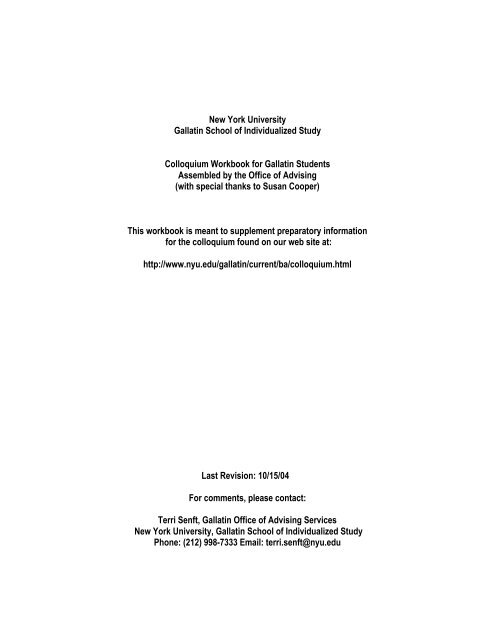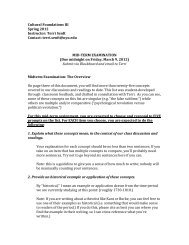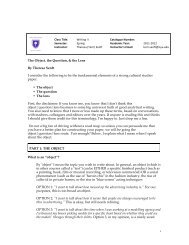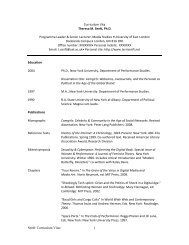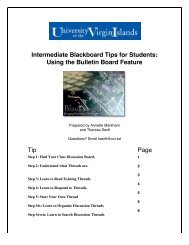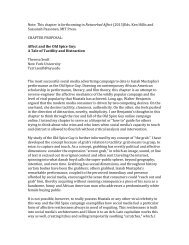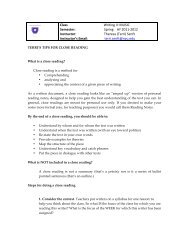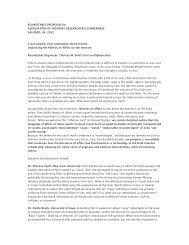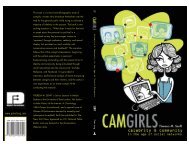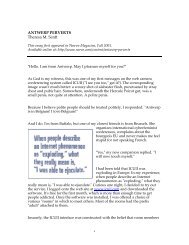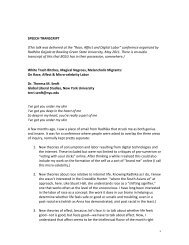New York University Gallatin School of Individualized ... - Terri Senft
New York University Gallatin School of Individualized ... - Terri Senft
New York University Gallatin School of Individualized ... - Terri Senft
You also want an ePaper? Increase the reach of your titles
YUMPU automatically turns print PDFs into web optimized ePapers that Google loves.
<strong>New</strong> <strong>York</strong> <strong>University</strong><br />
<strong>Gallatin</strong> <strong>School</strong> <strong>of</strong> <strong>Individualized</strong> Study<br />
Colloquium Workbook for <strong>Gallatin</strong> Students<br />
Assembled by the Office <strong>of</strong> Advising<br />
(with special thanks to Susan Cooper)<br />
This workbook is meant to supplement preparatory information<br />
for the colloquium found on our web site at:<br />
http://www.nyu.edu/gallatin/current/ba/colloquium.html<br />
Last Revision: 10/15/04<br />
For comments, please contact:<br />
<strong>Terri</strong> <strong>Senft</strong>, <strong>Gallatin</strong> Office <strong>of</strong> Advising Services<br />
<strong>New</strong> <strong>York</strong> <strong>University</strong>, <strong>Gallatin</strong> <strong>School</strong> <strong>of</strong> <strong>Individualized</strong> Study<br />
Phone: (212) 998-7333 Email: terri.senft@nyu.edu
2 <strong>of</strong> 20<br />
Table <strong>of</strong> Contents<br />
Who Are You? Your Intellectual Autobiography 3<br />
Finding a colloquium topic, from the “inside out” and the “outside in” 4<br />
Finding a colloquium topic, from the “inside out” 5<br />
Student Exercise: Priming the Pump 7<br />
Student Exercise: Use Google, and Know Google is not Enough! 8<br />
Finding a colloquium topic, from the “outside in” 9<br />
Student Exercise: The Book List 11<br />
Drafting your rationale: Six Steps 12<br />
Writing your rationale: Four Parts 16<br />
Who is in the conversation: Choosing a Committee 17<br />
Peer Review Worksheet 18<br />
Colloquium Notebook Book Page 19<br />
Utopian Conversations 20
Who Are You? Your Intellectual Autobiography<br />
At the beginning <strong>of</strong> your Colloquium you will be invited to take the first 15 minutes or so to talk<br />
about yourself, your program <strong>of</strong> study and how you came to be interested in the issues you raise in<br />
your rationale. If you have not completed an Intellectual Autobiography and Plan for Concentration<br />
(IAPC), the following exercise should help you. Even if you have written an IAPC, you may want to<br />
do this exercise again. As you move towards graduation it is very important that you gain practice<br />
in describing orally what you did at <strong>Gallatin</strong> so that it makes sense to outsiders.<br />
You might discuss some <strong>of</strong> the following:<br />
a) How you came to be studying at <strong>Gallatin</strong>.<br />
b) Things you learned in different settings (in <strong>Gallatin</strong> or in other parts <strong>of</strong> the university, in<br />
workshops as well as in classes, including if relevant your internships and/or pr<strong>of</strong>essional life).<br />
c) How you understand your studies and the themes you have chosen for your colloquium<br />
relating to your own history, your concentration, and/or your interests more generally.<br />
Feel free to organize your essay however you like--you are not obligated to consider a) b) and c) in<br />
any particular sequence, nor should you feet compelled to cover them in an artificially exhaustive<br />
manner. Once you finish your first draft, go through and cut out personal information that doesn’t<br />
tie into your life as a scholar. For instance, if your concentration is in cognition and sentience, it is<br />
right and appropriate to say something like, “Ever since I arrived in <strong>New</strong> <strong>York</strong> from Pakistan, I’ve<br />
been interested in how the phenomenon <strong>of</strong> diaspora shapes self-identity. ” However, statements<br />
like, “I initially came to <strong>Gallatin</strong> because I didn’t really know what to do” or “I chose my classes<br />
mainly because they allowed me to take internships in the real world” doesn’t tell your readers<br />
anything positive about you as an intellectual.<br />
3 <strong>of</strong> 20
Finding a colloquium topic, from the “inside out” and the “outside in.”<br />
There are many ways <strong>of</strong> arriving at a colloquium topic that interests you. Below, we<br />
discuss the difference between the “inside out” and “outside in” approach to finding<br />
your topic.<br />
The “inside out” approach works well for students who either lack a cohesive<br />
concentration, or who think <strong>of</strong> themselves as more practical than theoretical. Here,<br />
students engage in thought exercises that help them recall “pivotal moments” at<br />
<strong>Gallatin</strong>: personal flashes <strong>of</strong> excitement or insight gleaned either in courses,<br />
independent studies, internships, or even extra-curricular activities. Once the pivotal<br />
moments are determined, the student assembles a book list that links personal<br />
epiphanies with universal themes and questions.<br />
The “outside in” approach works well for students who have a relatively cohesive<br />
concentration and/or are good list-makers. In this approach, students begin with their<br />
transcript, making a list <strong>of</strong> all the classes they’ve attended and texts they’ve read<br />
during their time at <strong>Gallatin</strong>, and looking for themes that emerge from those. Another<br />
way to work “outside in” is to think <strong>of</strong> a particular class you liked and use that class’s<br />
syllabus as a springboard to imagine a new class <strong>of</strong> sorts, one that expands on the<br />
parts <strong>of</strong> the older class that particularly interested you.<br />
In this workbook, we’ll show you how reach a colloquium topic using both the<br />
“outside in” and “inside out” techniques. Even if you find yourself drawn to one<br />
approach, we recommend you attempt both. Students are <strong>of</strong>ten surprised at how<br />
much they learn about themselves while doing these exercises, and we wouldn’t<br />
want you to miss out on that experience.<br />
4 <strong>of</strong> 20
FINDING A COLLOQUIUM TOPIC FROM THE “INSIDE OUT”<br />
Tactic 1. Consider a problem within a theme<br />
A theme is a category, <strong>of</strong>ten broadly construed (as, for example, democracy, race, gender, sexual<br />
identity or class) and can be applied to a number <strong>of</strong> different historical periods or areas <strong>of</strong> the<br />
world. A theme may be labeled a problem if it is expressed as a question. Examples <strong>of</strong> appropriate<br />
colloquium questions derived from themes include:<br />
• What does “representation” mean, artistically and politically?<br />
• How did rationality and scientific thought become the dominant mode <strong>of</strong> thought in<br />
Western culture?<br />
• How have social trends been determined through history?<br />
• What does it mean to speak <strong>of</strong> “artificial intelligence”?<br />
Tactic 2. Find a timeless question within a specific period <strong>of</strong> interest.<br />
Many students find themselves drawn to a particular time in human history, such as the Middle<br />
Ages, the post-WWII period, or the Internet age. For a colloquium, a student might want to<br />
investigate a certain timeless question that emanates from their study <strong>of</strong> a particular period, such<br />
as:<br />
• How did the Industrial Revolution forever change what is meant by revolution?<br />
• What can Internet theorists <strong>of</strong> “social networks” learn from the architects <strong>of</strong> Rome, who<br />
designed some <strong>of</strong> the first road and plumbing systems?<br />
• What’s the connection between postmodernism and a renewed interest in Greek sophists?<br />
Tactic 3: Find a boundless question within a bounded area <strong>of</strong> interest.<br />
A student who studies a particular bounded area (bounded by geography or time, e.g. pre-<br />
Columbian South America or Imperial China in the 19 th century) may want to formulate a boundless<br />
question for their colloquium.<br />
• What are the artistic legacies <strong>of</strong> Islam (using Saudi Arabia, Malaysia, and <strong>New</strong> <strong>York</strong>)<br />
• Eastern European arts, bureaucracy and the state<br />
• Colonialism and the arts: India and China<br />
Tactic 4: Expand upon a legacy.<br />
Sometimes, a student with a narrow-sounding phenomenon (e.g., the Vietnam War, Darwin) but<br />
expands outward to look at related and contextual ideas and problems. Examples:<br />
• Darwin’s legacy: from biological to social theories <strong>of</strong> evolution<br />
• Pulitzer and other prizes: the history <strong>of</strong> market forces and publishing<br />
• Beyond Woodstock: mass organizing, the arts, and the future<br />
5 <strong>of</strong> 20
Tactic 5: Use performance to articulate a critical question.<br />
Many <strong>Gallatin</strong> students have taken classes that focus on theatre, dance, dramatic literature,<br />
acting/directing and other forms <strong>of</strong> performance. These studies lend themselves particularly well to<br />
critical questions. For example<br />
• From page to stage: the rewards and challenges <strong>of</strong> adaptation<br />
• Word made flesh: the relationship between religious texts and their performance<br />
• What are the politics <strong>of</strong> dressing (for example, recent debates on veiling, school dress<br />
codes, etc.)<br />
Tactic 6: Use methodology in a fresh way.<br />
Methodology refers to the application <strong>of</strong> a specific set <strong>of</strong> rules or procedures used by members <strong>of</strong> a<br />
discipline. For example, one may speak <strong>of</strong> ethnographic method (common to anthropology),<br />
discourse analysis method (common to those who study linguistics) or hermeneutic method<br />
(common to those who study popular culture.) Additionally, one may apply theory as methodology,<br />
as in the case <strong>of</strong> psychoanalytic theory, feminist theory, queer theory, Marxist theory, etc. A<br />
methodology-driven colloquium would be one in which the student ideally applies traditional<br />
theories in a fresh way. For instance:<br />
• Using methodologies <strong>of</strong> geography (e.g. mapping technologies) to discuss politically<br />
under-served areas through history<br />
• Integrating economic analyses into a discussion <strong>of</strong> scientific discoveries<br />
• Approaching the issue <strong>of</strong> women in music through feminist theories <strong>of</strong> representation,<br />
rather than “head counting”<br />
Tactic 6: Draw global questions from personal activities and experiences<br />
Many students begin their colloquium by beginning with an ostensibly narrow-sounding personal<br />
activity that expands into an exploration <strong>of</strong> global phenomenon. Some examples include:<br />
• Drawing on her time studying the Brazilian martial arts form capoeira, a student might<br />
create a colloquium title called, “Dance: Resistance in Motion?”?<br />
• Recalling his time interning at an NGO, a student might create a colloquium titled, “The<br />
Troubled Politics <strong>of</strong> Benevolence.”<br />
• Remembering her time as a photojournalist, a student might create a colloquium titled,<br />
“Just Be Yourself? How technology creates reality.”<br />
6 <strong>of</strong> 20
STUDENT EXERCISE: Priming the Pump<br />
The following exercise is designed to help you discover how much you already know about what<br />
you might want to discuss in your colloquium and to help you overcome your fear <strong>of</strong> drafting your<br />
rationale. Choose a topic you might want to talk about--perhaps an issue you enjoyed thinking<br />
about in a <strong>Gallatin</strong> seminar. You are not obligated to adhere to the topic you use here-we are just<br />
working on what it would feet like to get started. This exercise can serve as a point <strong>of</strong> departure for<br />
your next meeting with your advisor.<br />
Pretend that each <strong>of</strong> the following sentences is opening to a paragraph in a draft rationale. Copy<br />
the sentence and finish it. Then fill out each paragraph with three sentences elaborating on the first<br />
sentence. In the last sentence <strong>of</strong> each paragraph try to <strong>of</strong>fer up examples <strong>of</strong> texts that support the<br />
claims you are making or that would be interesting to explore in light <strong>of</strong> your comments.<br />
The topic I would like to discuss in my colloquium is ____________________<br />
My own interest in this issue arises because ______________________<br />
Several complex questions arise when considering this topic, namely._______________<br />
The most useful text/author I can think <strong>of</strong> to begin addressing these questions is _________<br />
Because ______________________________________________<br />
However there are several other ways to explore this issue, as exemplified in works such as<br />
__________________________________________________________<br />
While there are many approaches to this subject the approach I find most satisfying in the end is<br />
that <strong>of</strong> ______________________________________________<br />
Because ______________________________________________<br />
However the following issues remain to be addressed: ______________________<br />
Notes<br />
1) Free writing is a useful point <strong>of</strong> departure, but your own rationale drafts should not contain these<br />
sample sentences--by the time you have a rationale draft to submit you should have progressed<br />
well beyond this exercise.<br />
2) You will discover right away that it is hard to say anything substantial about the issues you are<br />
interested in without referring to some major texts-so you must go back to your books immediately<br />
to draft a more thoughtful version <strong>of</strong> your rationale.<br />
7 <strong>of</strong> 20
STUDENT EXERCISE: USE GOOGLE, AND KNOW THAT GOOGLE IS NOT ENOUGH!<br />
If you are searching for possible texts to use for your colloquium, the Google search engine on the<br />
Web can provide all sort <strong>of</strong> tips, some useful and others not. One <strong>of</strong> the most effective ways to<br />
search on Google is to type in your interests, plus the word “syllabus.” This should send you to all<br />
sorts <strong>of</strong> course listings, with all sorts <strong>of</strong> bibliographies.<br />
But don’t end your search at Google. Utilize that tuition you are paying by downloading full texts <strong>of</strong><br />
copyrighted journal articles for FREE. Yes, NYU’s site license allow you to access all sorts <strong>of</strong> stuff<br />
you’ll never find on Google, all without leaving your house.**<br />
Intrepid students may want to explore all the options available to them at<br />
http://library.nyu.edu/collections/find_articles.html<br />
Other popular online databases include:<br />
Project Muse: http://muse.jhu.edu/<br />
Full-text online access to all journals published by the Johns Hopkins <strong>University</strong> Press. Disciplines<br />
covered are humanities, social sciences, and mathematics. <strong>Terri</strong>'s notes: I find this the most user<br />
friendly <strong>of</strong> all the databases. It allows you to print from HTML or in PDF form.<br />
J-Stor (Scholarly Journal Storage): http://www.jstor.org/<br />
Provides image and full-text online access to back issues <strong>of</strong> selected scholarly journals in history,<br />
economics, political science, demography, mathematics and other fields <strong>of</strong> the humanities and<br />
social sciences. <strong>Terri</strong>'s notes: Be sure to check both J-Stor AND Project Muse, since they tend to<br />
cover different journals in overlapping fields.<br />
Lexis-Nexis: http://web.lexis-nexis.com/universe<br />
This is what attorneys, legislators and reporters use to research court cases, legislation, business<br />
news, and general press coverage <strong>of</strong> events. <strong>Terri</strong>’s notes: for magazine coverage, be sure to also<br />
check ProQuest, below.<br />
ProQuest: http://library.nyu.edu/collections/find_articles.html (and then click on “ProQuest”<br />
on the right-hand side <strong>of</strong> page)<br />
<strong>Terri</strong>’s notes: this is where I search for newspaper and magazine coverage on topics.<br />
Digital Dissertations: http://wwwlib.umi.com/dissertations/gateway<br />
This is what it sounds like. Dissertations from your home school are usually free; others are<br />
available at a cost to you. Really useful for estoteric stuff.<br />
**Note: If you are accessing these services from home, be sure to set your Web browser proxy to<br />
NYU’s server, by following the directions at http://www.nyu.edu/its/faq/connecting/proxy.html<br />
8 <strong>of</strong> 20
FINDING A COLLOQUIUM TOPIC FROM THE “OUTSIDE IN”<br />
Tactic 1: Beginning with your transcript.<br />
Below are some examples <strong>of</strong> colloquium topics constructed by hypothetical students with<br />
concentrations in arts & activism, writing, and science and technology.<br />
Examples <strong>of</strong> colloquium topics drawn from concentrations in arts & activism<br />
• Coursework in psychology, Art and Public Policy, Social Work, <strong>Gallatin</strong> arts workshops,<br />
Education classes. Possible colloquium title: “Art therapy as social rehabilitation.”<br />
• Coursework in Mathematics, <strong>Gallatin</strong> community learning classes, sociology, economics,<br />
computer science, <strong>Gallatin</strong> Arts workshops. Possible colloquium topic: “Designing ‘social<br />
s<strong>of</strong>tware’ and networking and social change.”<br />
• Coursework in East Asian studies, politics, anthropology, cinema studies, comparative<br />
literature, Asian-American studies. Possible colloquium title: “The ‘warrior-artist’ (samurai)<br />
in fact, fiction and myth.”<br />
• Coursework in Earth sciences, fine arts, metropolitan studies, <strong>Gallatin</strong> arts workshops,<br />
<strong>Gallatin</strong> community learning classes. Possible colloquium title: “What’s “green” about<br />
Green Architecture?”<br />
Examples <strong>of</strong> colloquium titles drawn from concentrations in writing:<br />
• Courses in political science, area studies <strong>of</strong> Russia and China, comparative literature.<br />
Possible colloquium title: “The risk <strong>of</strong> writing in authoritative regimes”<br />
• Courses in interactive telecommunications, computer science, mathematics, <strong>Gallatin</strong><br />
writing workshops. Possible colloquium title: “The art and science <strong>of</strong> technical writing.”<br />
• Courses in cinema studies, film and television, Spanish, Latin American studies. Possible<br />
colloquium topic: “Writing Latin American presence”<br />
• Courses in psychology, theatre studies, comparative literature, <strong>Gallatin</strong> writing workshops.<br />
Possible colloquium title: “What makes writing funny?”<br />
Examples <strong>of</strong> colloquium titles drawn from concentrations in science and technology:<br />
• Courses in photography, art history, biology, education. Possible colloquium title: “Imaging<br />
the Body: From Galen to the MRI.”<br />
• Courses in psychology, women’s studies, chemistry. Possible colloquium topic: “Gender,<br />
mental health and the ‘medication’ tradition.”<br />
• Courses in religion, archeology, English. Possible colloquium topic: “England in myth and<br />
stone.”<br />
• Courses in Asian American studies, cinema studies, interactive telecommunications,<br />
comparative literature. Possible colloquium title, “Asians as technologists: Myths and<br />
Facts.”<br />
Tactic 2: Expanding an existing syllabus:<br />
9 <strong>of</strong> 20
Here is an example <strong>of</strong> how one might work from an existing syllabus. While in high school,<br />
hypothetical <strong>Gallatin</strong> student “Nancy” developed an interest in religion. In her first year at <strong>Gallatin</strong>,<br />
she signed up for the first year seminar "Pilgrimage, Sacred Places and Remarkable Outsiders."<br />
Yet while Nancy enjoyed most <strong>of</strong> the class content, she <strong>of</strong>ten found herself wishing her teacher<br />
would speak more about secular journeys in addition to spiritual ones. As she progressed beyond<br />
her first year, Nancy found herself drawn to courses in anthropology and globalization in addition to<br />
her initial interest in religion. Nancy has decided that she will title her colloquium, “Spiritual and<br />
Secular Journeys: the Quest for Meaning.” For her book list, Nancy draws primarily from texts read<br />
in college classes, and supplements them where necessary with new reading. Note: underlined<br />
texts refer to books Nancy has read for classes.<br />
Ancient, Medieval, and Renaissance Classics (pre 1650) (7 or more texts)<br />
Exodus and Psalms<br />
Travel narratives <strong>of</strong> lba Battuta and Ibn Jubayr (medieval Muslim travelers)<br />
The Book <strong>of</strong> Margery Kempe<br />
Chaucer's Canterbury Tales<br />
The Epic <strong>of</strong> Gilgamesh<br />
Homer, The Odyssey.<br />
The Son-jara.Epic<br />
Modernity - the Humanities (post 1650) (4 or more texts)<br />
Matsuo Basho, The Narrow Road to the Deep North.<br />
John Bunyan, Pilgrim's Progress<br />
Mircea Eliade, The Sacred & The Pr<strong>of</strong>ane<br />
Travel Narratives <strong>of</strong> Richard Burton and John Burkhardt<br />
The Autobiography Malcolm X<br />
Mary Louise Pratt, Imperial Eyes<br />
Modernity - The Social and Natural Sciences (4 or more texts)<br />
Victor Turner, Dramas, Fields, and Metaphors<br />
Michael Sallnow, Pilgrims <strong>of</strong> the Andes<br />
C. Bawa Yamba, Permanent Pilgrims<br />
James Clifford, Routes<br />
Area <strong>of</strong> Concentration (5 or more texts)<br />
Edward Said, Orientalism.<br />
Clifford and Marcus, Writing Culture<br />
Paul Gilroy, BlackAtlantic.<br />
Arjun Appadurai, Modernity at Large: Cultural Dfimensions <strong>of</strong> Globalization<br />
Caren Kaplan, Questions <strong>of</strong> Travel<br />
10 <strong>of</strong> 20
EXERCISE FOR STUDENTS: THE BOOK LIST<br />
This is playful exercise to help students who are having a hard time settling on any theme and can't<br />
decide what books they would like to think about.<br />
Scenario I (Desert Island): You have been marooned on a Desert Island. What five books do you<br />
wish you had with you to sustain you in your solitude? Are they the same books you would have<br />
wanted when you graduated from High <strong>School</strong>?<br />
Scenario 2 (Fahrenheit 451): An evil empire has taken over the world and is destroying all books.<br />
What five books will you choose to memorize to save for posterity? Does it make a difference what<br />
kind <strong>of</strong> an evil empire we are dealing with?<br />
Scenario 3 (Emergency Library): A natural disaster is sweeping the East Coast, destroying all<br />
libraries in its wake. Before it strikes you have just enough time to grab five books that will be<br />
crucial to continue the work you feet is most - important to you. Which five will you grab? Does it<br />
make a difference what kind <strong>of</strong> work you hope to accomplish?<br />
Scenario 4 (Five Books):<br />
• List five books that you hated reading at the time, but that in retrospect you are glad you<br />
read. Why are you glad you read them?<br />
• List five books that changed the way you think about something that matters to you.<br />
• List five books that improved you in some important way--practical, spiritual, physical, etc.<br />
• List five books that gave you pleasure and that-you would enjoy rereading.<br />
11 <strong>of</strong> 20
DRAFTING YOUR RATIONALE: Six Steps<br />
by <strong>Terri</strong> <strong>Senft</strong> (terri.senft@nyu.edu)<br />
If you are reading this, you are probably looking for guidance regarding your rationale. To help<br />
students, I’ve developed a “how to” sheet that combines insights from Sara Murphy and Vasu<br />
Varadhan with my own thoughts on the subject.<br />
Below, you'll see I've broken the rationale writing process into six steps, which I <strong>of</strong>fer to students<br />
with the huge caveat: you must resist the temptation to follow my steps as if using a recipe to bake<br />
a cake. There are two important reasons for this. First, every primary adviser has a different view <strong>of</strong><br />
the rationale drafting process, and you need to confer with your own adviser before taking<br />
everything I say here to heart.<br />
Second, even if you adviser DOES agree with my view <strong>of</strong> the rationale drafting process, you may<br />
want to change the order <strong>of</strong> the steps below, combine elements from different steps, and so forth.<br />
Rather than sequential dictates to be followed in chronological fashion, think <strong>of</strong> these steps more<br />
as "check boxes" to get you started, and to review to check for anything missing once you draft<br />
your rationale. To keep the recipe analogy, you aren't just making A cake; you are making YOUR<br />
cake. Your rationale should reflect your mode <strong>of</strong> thinking, not mine.<br />
Now, to the steps...<br />
1. Briefly describe your experience at <strong>Gallatin</strong> and how you formed your concentration.<br />
How and why did you come to be here? What is your area <strong>of</strong> concentration? What have<br />
you done (classes, indie studies, internships, creative work outside <strong>of</strong> <strong>Gallatin</strong>) in<br />
conjunction with your concentration topic? What was the most important book, film, exhibit,<br />
article, image you experienced to date? Why?<br />
2. Articulate three questions stemming from your concentration that you plan on exploring in your<br />
colloquium.<br />
I suggest thinking <strong>of</strong> your rationale as if it were a pitch for a course you might teach, rather<br />
than a formal research paper with well-developed argumentation. Sara Murphy points out<br />
that just as a department has many courses it <strong>of</strong>fers its students, your concentration will<br />
likewise be a big area <strong>of</strong> inquiry. What you want to do in your rationale, and latter in your<br />
colloquium is map out a specific angle or issue that you are focusing on within the<br />
concentration.<br />
To do this,it helps to focus your rationale around a series <strong>of</strong> interrelated questions<br />
stemming from and honing in on a specific element <strong>of</strong> your concentration. This is <strong>of</strong>ten the<br />
most difficult part <strong>of</strong> writing the rationale, and it helps to consult with your adviser here,<br />
since different advisers have different understandings <strong>of</strong> the colloquium’s breadth. For me,<br />
“commodity culture” would be a concentration topic, “women and commodity culture“ might<br />
be a colloquium topic, and one question raised in the rationale might be, “What does it<br />
mean to speak <strong>of</strong> the female consumer?” Other advisers will have different understandings<br />
<strong>of</strong> the concentration/colloquium/questions paradigm than the one I’m mapping here,<br />
though, which is why it’s important to double-check with them before proceeding too far<br />
into the rationale process.<br />
12 <strong>of</strong> 20
While I recommend you come up with at least three inter-related questions, you could have<br />
more, or even less than three. Here are some popular ways to articulate your questions:<br />
A. Begin with the words "what" and/or "how." For example, if your concentration is<br />
in reception and the arts, you might ask, "What does it mean to speak <strong>of</strong> emotion<br />
in music?" If your concentration is in theories <strong>of</strong> modernism, you might ask, "How<br />
has the notion <strong>of</strong> collage figured in formalism?" In order to avoid dangerous<br />
philosophical terrain, try not to use "why" when formulating your questions.<br />
B. Use the "here's a contradiction" approach. Sara Murphy gives this example:<br />
"Reading works in political theory and women’s studies, I noticed something<br />
intriguing. While we <strong>of</strong>ten think <strong>of</strong> the period <strong>of</strong> the long nineteenth century as<br />
ushering in a kind <strong>of</strong> repressive series <strong>of</strong> attitudes toward women and public life, it<br />
is also the period when modern feminism takes root and makes a very large<br />
impact on social, cultural, and political life. How could I account for this apparently<br />
mysterious contradiction?"<br />
C. Contest a black and white view <strong>of</strong> a phenomenon. Sara Murphy gives this<br />
example: “While developing my concentration in post-coloniality and its<br />
manifestations in literature and culture, I noted that one major idea scholars speak<br />
<strong>of</strong> is called “hybridity or hybridization.” According to the critic Homi Bhabha, this<br />
means that there is an interpenetration between the cultures <strong>of</strong> colonized peoples<br />
and the cultures <strong>of</strong> those who are or have been colonizers. Some writers seem to<br />
celebrate this. But I have come to wonder about it. Doesn’t this mean, at least in<br />
part, that formerly colonized peoples have lost their cultures <strong>of</strong> origin perhaps<br />
definitively? Could this be imperialism by other means? "<br />
D. Try the “what are we not seeing here” approach. gain from Sara Murphy: "As I<br />
developed my concentration in literature and politics, I began to ask myself<br />
whether European novelists in the 20th century were interested in politics at all. It<br />
seemed odd: while the nineteenth century novels I read were so concerned with<br />
the events <strong>of</strong> day--Eliot, Thackeray, Balzac, for instance--the twentieth-century<br />
Western European novelists I read seemed interested only in forms and<br />
innovations in representation. Was there any political agenda, I came to wonder, in<br />
James Joyce’s Ulysses? In Virginia Woolf’s The Waves? Here’s what I think so<br />
far…"<br />
3. Demonstrate that you understand that the roots <strong>of</strong> your three questions can be found within<br />
ancient texts.<br />
Vasu Varadhan argues that nearly every abstract question you can think <strong>of</strong> has its roots in<br />
ancient thought. You probably want to list about four ancient texts in your rationale that<br />
both "tell" and "show" something about your questions. For instance, you could link the<br />
colloquium question, "What makes a great speech?" to Aristotle's Rhetoric, which works<br />
by TELLING the reader what makes great speechifying. You could also link it to<br />
Shakespeare's Julius Caesar, which shows a great example <strong>of</strong> classic oratory in Marc<br />
13 <strong>of</strong> 20
Anthony's "Friends, Romans, Countrymen" speech.Here are the most common ways<br />
students link ancient texts to their colloquium question:<br />
A. Chronological precedent: In this case, the student uses an ancient text to<br />
situate the date a modern phenomenon may have in fact “begun” Examples: Using<br />
Travels <strong>of</strong> Marco Polo to suggest that globalization may have initiated long before<br />
modernity; using writing <strong>of</strong> Sappho trace the history <strong>of</strong> “feminine writing”.<br />
B. Dramatic analogue: In this case, a student uses a work <strong>of</strong> theatre, poetry,<br />
fiction etc. to demonstrate explore the ancient roots <strong>of</strong> a particular psychological or<br />
sociological phenomenon. Examples: Exploring how ambition fuels the characters<br />
in Macbeth; demonstrating that Antigone struggled with the issue <strong>of</strong> family versus<br />
the state; discussing the social protests against war articulated by the women in<br />
Lysistrata, etc. etc.<br />
C. Philosophical Genealogy: In this case, a student explores the ancient<br />
roots <strong>of</strong> a particular contemporary philosophical question they are considering.<br />
Examples: Comparing the treatment <strong>of</strong> simulation in Plato’s Republic to<br />
Baudrillard’s Simulations; using Kant’s writings on the sublime to theorize natural<br />
disaster reporting.<br />
D. Philosophical Critique: In this case, a student critically assesses the<br />
political and social costs <strong>of</strong> an ancient text. Example: Luce Irigaray’s feminist<br />
critique <strong>of</strong> Plato’s Cave metaphor; Homi Bhabha’s postcolonial critique <strong>of</strong><br />
Aristotle’s theories <strong>of</strong> mimicry and mimesis.<br />
4. Demonstrate how your three questions are interdisciplinary in nature, spanning the humanities,<br />
the social sciences and/or the natural sciences.<br />
The chief way you’ll be able to demonstrate a through-line between ancient texts and<br />
contemporary concerns is through a brief discussion <strong>of</strong> modernity. Although you won’t<br />
have to cover everything, you need to speak about one or two major shifts from antiquity to<br />
the present day, with regard to your subject matter. Possible topics would include the<br />
introduction <strong>of</strong> the printing press, the spread <strong>of</strong> mass media, the development <strong>of</strong> the city,<br />
the arrival <strong>of</strong> women’s suffrage and feminism, the rise <strong>of</strong> psychology and other social<br />
sciences, the social power <strong>of</strong> the novel, the rise <strong>of</strong> the bourgeois, and so forth. Again, your<br />
choice <strong>of</strong> text may be one that tells the reader about the subject (e.g. Karl Marx's notion <strong>of</strong><br />
commodity, Freud's notion <strong>of</strong> the superego) and/or one that shows the reader (e.g. novels<br />
about the industrial revolution, plays about the inner life <strong>of</strong> the housewife, etc.) You<br />
probably want to list about four texts in your rationale.<br />
5. Articulate the stakes <strong>of</strong> your colloquium by grounding your abstract questions in concrete,<br />
contemporary material.<br />
There are many ways to articulate the stakes <strong>of</strong> your colloquium, or what researchers call<br />
the "so what" question. One approach is to cite stories from your life that can serve as test<br />
cases. Another approach is to discuss general trends in contemporary life. A third is to<br />
14 <strong>of</strong> 20
ing in audio or visual objects to serve as touch points for discussants. In this section <strong>of</strong><br />
the rationale, your job is to explain what you plan on doing to make your colloquium come<br />
to life.<br />
For instance, to ground the question, "What constitutes success in art?" a student might<br />
draw on a personal experience interning for a television station that rejected a<br />
documentary on a noteworthy topic because it wasn't 'sexy' enough. Alternately, he or she<br />
might discuss the difficulty that genre-defying visual artists have breaking into today's art<br />
market. Still another approach might be to briefly replicate a classic psychology experiment<br />
where students were asked to adjudicate certain slides <strong>of</strong> art work. Imagination can be<br />
great thing in this section <strong>of</strong> the rationale, but it is important to remember that when it<br />
comes time for the colloquium, demonstrations should last only as long as necessary to<br />
make your point and no longer.<br />
6. Don't shy away from contradictions and confusions regarding your colloquium topic.<br />
This is the time to talk about any "wild card" texts your ntroduce to your colloquium, or any<br />
other general ideas that contradict, confuse or generally "dirty up" your clean thoughts<br />
about your colloquium topic. As Sara Murphy writes, "Don't shy away from them. Put them<br />
out there."<br />
15 <strong>of</strong> 20
WRITING YOUR RATIONALE: FOUR PARTS<br />
Part 1: Your Title<br />
Your title should ideally entertain the reader, and let her know what is coming. When in doubt, you<br />
can always use the colon for effect, as in “When Gay White Men Sing Like Black Women: Reading<br />
Race, Sexuality and Class in Musical Performance.” (This really was a colloquium title!)<br />
Part 2: Your Hook<br />
Traditionally, the hook is a short paragraph or even a sentence that is emblematic <strong>of</strong> the whole,<br />
draws the reader in, and/or makes her curious for more. Hooks can be sentences, such as “What<br />
does it mean to speak <strong>of</strong> the personal as political, in a time <strong>of</strong> televised confessions and reality<br />
entertainments?” A hook can also be a story from your intellectual autobiography that sums up why<br />
your colloquium topic matters so much to you.<br />
Part 4: The Body<br />
This is the material covered in “Six Steps to a Rationale,” above.<br />
Part 5: The Ending<br />
Ideally, your ending indicates that you understand yourself in an ongoing investigation <strong>of</strong> your<br />
topic, and that your colloquium is only one stop along the road to life-long learning.<br />
16 <strong>of</strong> 20
Who is in the conversation: Choosing a Committee<br />
One very important way that you can be pro-active rather than passive in your Colloquium is by<br />
choosing the members <strong>of</strong> your committee carefully. Thinking about who you want to take part in<br />
your Colloquium conversation early is smart—you can show drafts <strong>of</strong> your rationale and booklist to<br />
all the members to get feedback an a sense for the kinds <strong>of</strong> questions each is likely to pursue.<br />
Your committee must have three members. One <strong>of</strong> them will be your advisor, and if your advisor is<br />
a full-time <strong>Gallatin</strong> pr<strong>of</strong>essor then the other two members can come from anywhere in the<br />
<strong>University</strong>, whether as faculty or as adjuncts. If your advisor is not on the <strong>Gallatin</strong> faculty then you<br />
will need to seek out one full-time <strong>Gallatin</strong> person to serve on your committee, but the third person,<br />
again, can come from anywhere in the <strong>University</strong>.<br />
Step 1:<br />
Take some time to think about the pr<strong>of</strong>essors you have taken courses with. Which would you enjoy<br />
having in the room when you discuss the issues your rationale raises? Are there any you would<br />
prefer not to have on the committee? Which ones are <strong>Gallatin</strong> faculty? You may need to sit down<br />
with your advisor, a <strong>Gallatin</strong> pr<strong>of</strong>essor, or one <strong>of</strong> the advisement team to seek help and advice in<br />
order to fill out your committee. The whole process will go more smoothly and be less intimidating if<br />
you can picture who will be in the room!<br />
Step 2<br />
Find out the phone numbers, <strong>of</strong>fice hours, and email addresses <strong>of</strong> anyone you think you would like<br />
to approach about being on your Colloquium. Make sure you have copies <strong>of</strong> your booklist and<br />
rationale that you are proud <strong>of</strong> so that you can show yourself to advantage. Then contact the<br />
pr<strong>of</strong>essor and politely find out whether the pr<strong>of</strong>essor would find the topic interesting and when he<br />
or she is generally available.<br />
Step 3:<br />
Figure out when the three people you want on the committee could conceivably all meet and<br />
propose a specific time and date (recall that the oral is 2 hours). If all three agree then you are<br />
ready to fill out a Colloquium Registration form to reserve a time slot and get the process in motion<br />
for a room to be found for your exam. Give the signed form to Kathe Anne Joseph on the 8 th floor<br />
<strong>of</strong> 715 Broadway.<br />
17 <strong>of</strong> 20
Peer Review Worksheet<br />
No one writes well without feedback. Use this form to elicit comments from a peer you trust.<br />
Reviewer: __________________________________<br />
Student whose rationale is under review: _______________________________<br />
Imagine that you are the student's advisor and that this is the first draft <strong>of</strong> his or her rationale that<br />
you have encountered. Your want your advisee to write the very best rationale possible, one that is<br />
a useful point <strong>of</strong> departure for an interesting and challenging conversation. To serve the student<br />
well the rationale must be readily understandable to all <strong>of</strong> the members <strong>of</strong> the committee. Help the<br />
student out by responding to the following questions:<br />
A.) What parts <strong>of</strong> the rationale seem to you to be strongest? Are there ideas or observations that<br />
are particularly striking, unique, or thought provoking?<br />
B. ) What parts <strong>of</strong> the rationale don't you understand--are there terms to be clarified, connections<br />
left unmade, logical moves that don't make sense, examples needed but missing? Are there<br />
aspects <strong>of</strong> the rationale that seem obvious to you? Sections that could be cut?<br />
C.) Based on your assessment above, what would you suggest the student do next? Are there<br />
other questions he or she should pursue? Can you suggest books that might be added or<br />
removed from the booklist? Try to be as specific as possible; feel free to mark passages on the<br />
rationale itself so long as you explain your thinking clearly in writing.<br />
18 <strong>of</strong> 20
Colloquium Notebook Book Page<br />
You are permitted to bring a notebook with your own notes to the Colloquium - some students even<br />
bring the books themselves! But it is not a good sign if a student devotes most <strong>of</strong> the Colloquium to<br />
flipping through a notebook. This page is to help you get a sense for the kinds <strong>of</strong> information you<br />
will want to make sure you have recorded in your notebook. Ideally, once you are well prepared<br />
you won't need the notebook except as moral support.<br />
Title: _____________________________<br />
Author: ____________________________<br />
Date and language <strong>of</strong> first publication: ___________________________<br />
Imagine that someone on your committee has not read this book. How would you briefly<br />
characterize it (fiction or non-fiction, genre, period, audience, style)? How would you summarize it<br />
for them? What would you say the book teaches us? Are there important historical or cultural<br />
issues you think your committee member would need to know to understand the book?<br />
Who is the author <strong>of</strong> the book speaking to? Who is he or she in dialogue with--specifically what<br />
texts, authors, individuals? How is the author's position or "argument" unusual or distinctive?<br />
What theme or 'themes in the book do you in particular want to engage with? How would you<br />
speak back to the author if he or she were in the room? How would other authors on your list speak<br />
back to him or her?<br />
19 <strong>of</strong> 20
Utopian Conversations<br />
Most students are nervous about their upcoming Colloquium. It might help to think about what it is<br />
you are most afraid <strong>of</strong>, and then come up with some strategies to handle those problems should<br />
they arise. Voicing your fears will also make it more possible for your advisor and pr<strong>of</strong>essors to<br />
reassure you if those fears are simply unreasonable.<br />
But it is also important to ask yourself the more positive question, what do you yourself want the<br />
conversation to be like? What kind <strong>of</strong> a conversation would be disappointing? How can you be proactive,<br />
rather than passive, in producing the kind <strong>of</strong> Colloquium experience you will remember<br />
fondly later?<br />
1) What would the best conversation you could imagine be like? List five things that would be<br />
true about a really good conversation.<br />
2) What do your thoughts above suggest about what a bad conversation would be like? Is a bad<br />
conversation necessarily a scary one? What makes a conversation disappointing or unsatisfying?<br />
3) What are some <strong>of</strong> the ways you might influence the conversation? What specifically would you<br />
do to counter each <strong>of</strong> your fears? What specifically can you do to help the conversation live up to<br />
your own expectations?<br />
20 <strong>of</strong> 20


